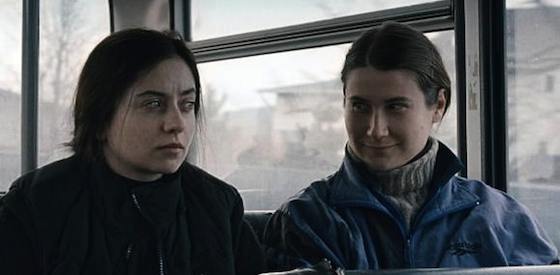- MENU
- HOME
- SEARCH
- WORLD
- MAIN
- AFRICA
- ASIA
- BALKANS
- EUROPE
- LATIN AMERICA
- MIDDLE EAST
- United Kingdom
- United States
- Argentina
- Australia
- Austria
- Benelux
- Brazil
- Canada
- China
- France
- Germany
- Greece
- Hungary
- India
- Indonesia
- Ireland
- Israel
- Italy
- Japan
- Korea
- Mexico
- New Zealand
- Pakistan
- Philippines
- Poland
- Russia
- South Africa
- Spain
- Taiwan
- Turkey
- USA
- BUSINESS
- WEALTH
- STOCKS
- TECH
- HEALTH
- LIFESTYLE
- ENTERTAINMENT
- SPORTS
- RSS
- iHaveNet.com: Movie Reviews

3 1/2 Stars
Of all the movies culminating in a rite of exorcism, Romanian writer-director Cristian Mungiu's remarkable "Beyond the Hills" stands alone.
It is a different sort of horror movie, focused on character and on the precarious emotional state of lovers whose affair has come to an abrupt close. The film's formal rigor is marked by long, meticulously composed shots often with six or eight or more characters jostling for attention within the frame, around a dinner table or a hospital bed. Mungiu, whose works include "4 Months, 3 Weeks and 2 Days" (once seen, never forgotten), allows his story to breathe and to evoke a community and a country where, as they say, everyone has their reasons. And nothing quite works as it should.
It springs from a real event. In 2005, BBC Bucharest bureau chief Tatiana Niculescu Bran reported on an incident in which a young woman visiting a friend, a novice in a rural Moldavian monastery, died after being subjected to a form of exorcism.
Mungiu's first pass at a dramatic treatment of these events hewed closely to the historical record. Then, with each subsequent draft, his screenplay invented its own relationships and situations, and "Beyond the Hills" left the curse of the stultifying docudrama behind.
"Alina, let me go. People are looking." So says the raven-haired Voichita, meeting her lifelong friend at the train station. Alina has returned to Romania from Germany. She can barely breathe for the desperate relief at seeing her old friend from the orphanage again.
But things are different now. Voichita cannot continue their relationship (the women became lovers at some point in their friendship, years earlier). She has joined an Orthodox monastery, The New Hill, a stern place where a dozen or so nuns in residence call the priest "Papa" and the visiting Alina rightly views everyone and everything as the key to her unhappiness.
At dinner, Papa preaches of the evils of the secular world. "Nothing is sacred," he says. "Everything is allowed." With Lent just around the corner, he urges Alina to confess her sins and, it's inferred, forget her feelings for Voichita.
Typical of the film's dramatic strategy, we never see that confession, only its aftermath, just as Alina's apparent suicide attempt at the monastery remains off screen. Mungiu cannily keeps us in a state of dread and wonder at just how far the events of "Beyond the Hills" will travel beyond the pale, plausibly. It's an enraging picture. It's also slyly amusing in its details, enough so that Guardian critic Peter Bradshaw characterized it as a "captivating tragic-comedy." I see where he's coming from: Mungiu, one of the key figures in the recent Romanian New Wave, creates a situation edging toward comically bleak disaster, thanks to well-meaning believers and, in the case of Voichita, a vulnerable young woman whose ex-lover isn't taking the end of the affair very well. "I've got someone else in my soul now," she tells Alina.
As a contemporary Romanian tragedy of bureaucratic manners, "Beyond the Hills" is full of moments familiar to anyone who's seen the best of the recent Romanian films such as "The Death of Mr. Lazarescu." There are always forms and paperwork to fill out, and those overseeing that paperwork ooze contempt for their victims, or disinterest in doing things correctly. The monastery's financial difficulties are rehashed through frequent discussions of buying on credit, the need for gas money, the no-win options available to those (such as Alina's thick-headed brother, who works in a car wash) who need a place to live. The first time an ambulance is called to the monastery, the nuns are told it's too far, and that they should instead pray for the increasingly violent Alina. Eventually hospitalized, Alina is diagnosed with paranoid schizophrenia, but she is told she can't stay because of overcrowding and renovations. "She needs to be kept away from stress," the paternalistic doctor (a mirror image of Papa, back at the monastery) informs Alina's keepers. The fatalistic Romanian sense of humor informs every frame of "Beyond the Hills."
In its Cannes premiere last year, Mungiu's film won a rare two awards (usually it's one per winner), for the screenplay and a shared actress award for the leading performers. As Alina, Cristina Flutur maximizes her character's watchful, coiled traits, and she's plenty fearless when in extremis. Cosmina Stratan's Voichita, plaintive and wide-eyed, suggests a woman ashamed of her past and unsure of the trust she's placed in Papa (Valeriu Andriuta), a power-plant worker who saw God one day and now heads the monastery.
The film's coda overstays its welcome and, I think, settles for an easy, weary shrug that belongs to a different picture. "4 Months" stayed sharp and riveting to the final second; this one's a little looser. But "Beyond the Hills" is an experience: 2 1/2 hours of real and supple cinema.
No MPAA rating: (violence, nudity).
Running time: 2:32.
Cast: Cosmina Stratan (Voichita); Cristina Flutur (Alina); Dana Tapalaga (Mother Superior); Valeriu Andriuta (Priest).
Credits: Written and directed Cristian Mungiu, based on the nonfiction novels by Tatiana Niculescu Bran; produced by Cristian Mungiu. A Sundance Selects release.
Copyright © Tribune Media Services, Inc.
'Beyond the Hills' Movie Review - Cosmina Stratan and Cristina Flutur